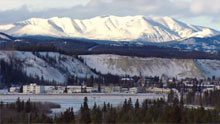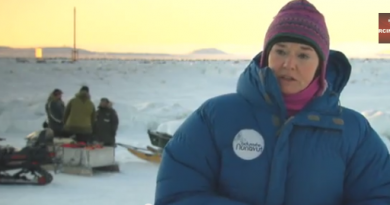Canadian City Left off WWF Earth Hour list Promises More Climate-Change Action
 Whitehorse officials say the city will do more to fight climate change, after some recent reports gave the Yukon capital a failing grade.
Whitehorse officials say the city will do more to fight climate change, after some recent reports gave the Yukon capital a failing grade.
Whitehorse has been left off the World Wildlife Fund’s latest Earth Hour list of Canadian cities that are fighting climate change.
The WWF report, released on Monday, puts Yellowknife — Whitehorse’s rival city — in the top 10 because of that city’s aggressive efforts to reduce greenhouse gas emissions.
The report is based on data from Corporate Knights magazine’s 2011 list of Canada’s most sustainable cities, which ranks Whitehorse in last place among six small cities. Yellowknife is in fourth place in the same category.
“Whitehorse has come in dead last, and that really irritates me because Yellowknife beat us,” Lewis Rifkind of the Yukon Conservation Society told CBC News on Monday.
Whitehorse is doing a relatively good job in combating climate change, but it scored particularly poorly in terms of infrastructure, said Josh Laughren, director of the WWF’s climate and energy program.
“What are the efficiency for your buildings? To what standards are new buildings required to comply when you’re retrofitting older buildings? Are there good incentives in place to encourage energy efficiency and conservation?” Laughren said.
Water usage a problem
Rifkind said the wasteful use of water in Whitehorse is a major problem.
“We’re having to pump a lot of water around the city. We then use it and then, of course, you have to treat a lot of that water through the sewage lagoons,” he said.
Mayor Bev Buckway agreed, adding that it does not help that Whitehorse is so spread out, meaning residents also depend more on driving around the city.
Buckway said there is a concerted effort by the city to encourage more people to use transit and to recycle and separate compost from their garbage.
“If you don’t have the buy-in from your residents or the corporate sector, then there’s a lot of things going in that landfill that shouldn’t be going in there. So again, we can do better on things like that,” she said.
“Those scores have probably picked up a lot of those little items where we all, personally, need to do a little better.”
But Buckway said public education takes time. Offering financial incentives to reduce, reuse and recycle is not an option, she added.
“If we have to pass out financial incentives or something for people to cut back and conserve, that sort of goes against the grain of what we’re trying to achieve,” she said.
Buckway said she believes Whitehorse will do better next year, citing the city’s growing efforts to reduce greenhouse gases and a decision by Yellowknife residents last week not to financially support that city’s plans for a geothermal heating system.



